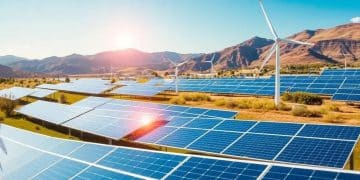Tax benefits of investing in renewable energy: Why it matters

Anúncios
Tax benefits of investing in renewable energy include significant credits and deductions that can lower your tax liability, such as the Investment Tax Credit and state-specific incentives for solar and wind projects.
Have you ever considered how tax benefits of investing in renewable energy can impact your finances? With the growing emphasis on sustainable practices, this topic deserves your attention. Let’s delve into the details and see how investing in green energy might just be the smartest financial choice.
Anúncios
Understanding tax deductions for renewable energy
Understanding tax deductions for renewable energy is essential for homeowners and businesses alike. These deductions can significantly reduce the amount of tax you owe, making investments in green technology much more attractive. Let’s explore what these deductions entail.
What Are Tax Deductions?
Tax deductions are expenses that you can subtract from your total income, lowering your taxable income. When it comes to renewing energy investments, there are specific deductions available that encourage individuals and companies to adopt cleaner energy solutions.
Anúncios
Examples of Tax Deductions
Here are some common deductions related to renewable energy:
- Cost of solar panels and installation
- Expenses related to wind turbines
- Costs for geothermal heating systems
- Energy efficiency home improvements
These deductions can cover a substantial portion of the expense, ultimately making renewable energy solutions more affordable.
Moreover, the process of claiming these deductions is often straightforward. Most taxpayers can take advantage of these benefits by filling out the appropriate IRS forms when they file their taxes.
Benefits of Deductions
Using tax deductions for renewable energy can lead to major savings. Not only do you receive a financial break upfront, but over time, you’ll likely save even more in reduced energy costs. Additionally, as energy-efficient home improvements increase property values, a deduction can also create equity in your home.
In conclusion, understanding the various tax deductions available can empower you to make informed decisions regarding renewable energy investments. By taking advantage of these benefits, you can contribute to a sustainable future while also enhancing your personal finances.
Exploring tax credits available for green investments

Exploring tax credits available for green investments can greatly benefit anyone looking to enhance their sustainability efforts. These credits are designed to encourage the transition to renewable energy and can lead to substantial savings on your tax bill.
Understanding Tax Credits
Tax credits directly reduce the amount of tax you owe. Unlike deductions, which lower your taxable income, credits decrease your tax liability on a dollar-for-dollar basis. This makes them especially valuable for anyone investing in renewable energy solutions.
Types of Tax Credits
There are several types of tax credits specifically geared toward promoting green investments:
- Investment Tax Credit (ITC) for solar energy projects
- Residential Energy Efficiency Property Credit for energy-efficient home improvements
- Production Tax Credit (PTC) for wind energy facilities
- Credits for geothermal and biomass energy systems
These credits take various forms and can be applied based on the investment made, ensuring that individuals and businesses are rewarded for going green.
In addition to immediate benefits, utilizing these credits can also lead to long-term financial improvements. By reducing upfront costs, investments become more feasible, encouraging more people to engage with renewable technologies.
Claiming Your Credits
Claiming these tax credits typically involves filling out specific forms during tax season but is relatively simple. Most people can find instructions on the IRS website or consult a tax professional for guidance. Accurately tracking your expenditures related to green investments is essential, as this will help substantiate your claims.
Overall, exploring the various tax credits available for green investments not only aids in financial relief but also contributes to a larger movement towards sustainability. Engaging with these opportunities can empower individuals and businesses alike to embrace a greener future.
Long-term financial benefits of renewable projects
The long-term financial benefits of renewable projects are significant and can greatly impact personal and business finances. Investing in renewable energy not only supports environmental sustainability but also yields substantial savings over time.
Reduced Energy Costs
One of the most immediate financial benefits comes from reduced energy costs. By utilizing renewable resources like solar and wind, households can generate their own electricity. This can lead to lower utility bills, especially as energy prices continue to rise.
Increased Property Value
Implementing renewable energy solutions can also increase your property’s value. Homes equipped with solar panels or energy-efficient systems often appraise higher than similar properties without these features. Potential buyers are increasingly looking for energy-efficient homes, making this a smart investment.
- Solar panels can add up to 4% to home value
- Energy-efficient upgrades are attractive to buyers
- Government incentives can enhance property value even further
Moreover, properties with renewable energy installations often sell faster than those without, allowing for a significant return on investment when it comes time to sell.
Tax Advantages
Financial incentives such as tax credits and deductions provide even more benefits. By investing in renewable technology, individuals can take advantage of federal and state programs designed to offset costs.
While initial expenses may seem high, the long-term savings and benefits typically far outweigh them. Government incentives help cover part of the investment, making renewable energy more accessible.
In addition to these direct financial benefits, renewable projects also contribute to energy independence, reducing reliance on fossil fuels and their volatile prices. This stability is an attractive aspect for both homeowners and businesses looking to secure their energy future while saving money.
How to maximize your renewable energy tax benefits

Maximizing your renewable energy tax benefits is crucial for getting the most out of your investment in green technology. Understanding the steps involved can help you save significant amounts on your taxes.
Track Your Expenses
Keeping detailed records of all expenditures related to your renewable energy projects is essential. This includes costs for equipment, installation, and maintenance. By maintaining thorough documentation, you can substantiate your claims and ensure you receive all eligible deductions and credits.
Research Available Incentives
There are numerous federal and state incentives that can enhance your tax benefits. It’s important to research the programs available in your area. Common incentives include:
- Federal Investment Tax Credit (ITC) for solar projects
- Local rebates for installing energy-efficient systems
- State tax credits for renewable energy investments
- Grants for energy efficiency upgrades
These options can vary by location and may change annually, so staying informed is key.
Additionally, consulting with a tax professional who specializes in renewable energy can provide invaluable insight. They can help you navigate the complex tax landscape effectively, ensuring you maximize your benefits.
Timing Your Installation
The timing of your renewable energy installation can also influence your tax benefits. If you plan your investment to align with tax years when you expect to have higher taxable income, you can take full advantage of your tax credits. Furthermore, some credits and deductions may apply based on when the systems are installed or put into operation.
As a final point, it’s important to understand how these tax benefits can be combined. Some taxpayer benefits can even be stacked, enabling you to maximize your savings. Engaging with community programs, local utilities, or state energy offices can lead to additional savings and incentives that bolster your investment.
FAQ – Frequently Asked Questions about Renewable Energy Tax Benefits
What are renewable energy tax benefits?
Renewable energy tax benefits include credits and deductions that reduce your tax liability when you invest in renewable energy systems like solar or wind.
How can I track my expenses for tax benefits?
You should keep a detailed record of all costs related to your renewable energy projects, including equipment, installation, and maintenance.
What incentives are available for renewable energy projects?
Incentives may include federal and state tax credits, rebates, and grants designed to encourage energy-efficient upgrades and installations.
Is it worth consulting a tax professional?
Yes, a tax professional can guide you in maximizing your renewable energy tax benefits and ensure you’re taking full advantage of available incentives.





